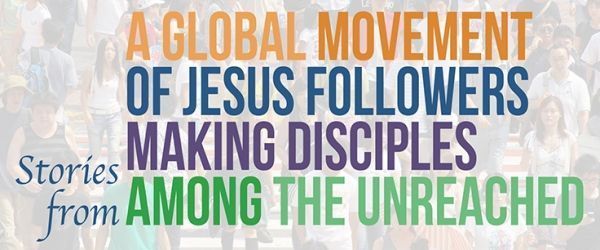
Couched in love
This is part of a series of stories that illustrate how our workers around the world see SEND’s new vision statement— A global movement of Jesus followers making disciples among the unreached —becoming reality. This story focuses on “ making disciples ” — a crucial aspect of starting new churches, because obedient disciples will form churches that impact their communities and beyond.
Today we share a story out of Central Asia, where our small team magnifies its influence by intentionally training national believers to reach out within their own communities.
• • •
By MK — Our vision in Central Asia is to see a movement of disciples making disciples. However, many of the people in this part of the world are very closed to the idea of becoming a follower of Jesus. In order to address this problem, our team trains the local church about how to effectively engage communities with the gospel.
One man, Friday, is doing this in his small village. Friday has been a believer for some time now, but his wife and children are not. Friday attended a training that was conducted in a nearby town. He left that time encouraged and with a plan to reach his family, neighbors, and co-workers. The first step of his plan was to pray each morning for open doors to share a spiritual truth or to serve someone in need.
One of Friday’s neighbors has had a drinking problem for many years. This, of course, caused many troubles in this neighbor’s home. Friday and his wife could hear the dishes and furniture crash to the ground one night as this neighbor fought with his wife. The next day, they learned that the previous night’s conflict had been the last straw and that this man was now living on the street. After a few nights, he found a cramped apartment in the center of town. Since he had no furniture, he simply slept on the floor.
Not long after, as Friday was driving home from work, he noticed a man throwing out a couch on the curb. He asked, “Excuse me, what are you doing with that couch?” The man replied, “I bought a new one and don’t need this old one anymore.” “Do you mind if I take it?” Friday quickly asked. The man agreed and Friday hoisted the couch onto the roof of his car and sped away.
Friday drove to his estranged neighbor’s apartment and hauled the couch up the stairs. After much effort, he knocked on the door and was met by a gruff face.
“What do you want?”
“I brought you a couch for your apartment.”
“Why would you give me a couch?”
Friday thought for a moment, then replied: “Jesus wants you to have this couch.”
Friday saw the man’s countenance change as they, together, moved the couch into the unfurnished apartment.
This man had heard about the Bible and Jesus before, but had always had a very negative reaction. This time, after they got everything settled and sat down to rest, the man looked over at Friday and said, “Tell me more about this Jesus.”
Friday was ready with his Bible. He opened up to the book of Genesis and began telling story after story of how God created everything, called Abraham, and promised to send the suffering servant who would take the world’s sins upon himself. With each story, this man became more and more aware of his need for forgiveness. At the end Friday asked him, “Will you follow Jesus?” The man answered with his eyes tearing up, “Yes!”
Friday has since been meeting regularly with this new disciple, not only teaching him, but showing him what it means to be a follower of Jesus in this part of the world where believers are few and far between.
• • •
As Central Asian people are exposed to the word of God and are sacrificially served, hearts are being softened; deep and meaningful relationships are being built. Our Central Asia team need more workers to come and be salt and light to the people of Central Asia. Could God be calling you to join the global movement of Jesus followers making disciples among the unreache d ? Explore opportunities to serve in Central Asia.
• Our total commitment to Jesus Christ fuels all that we do. Read SEND’s statement of faith.
• Learn about SEND International's mission, focus, and values.
Additional Posts





